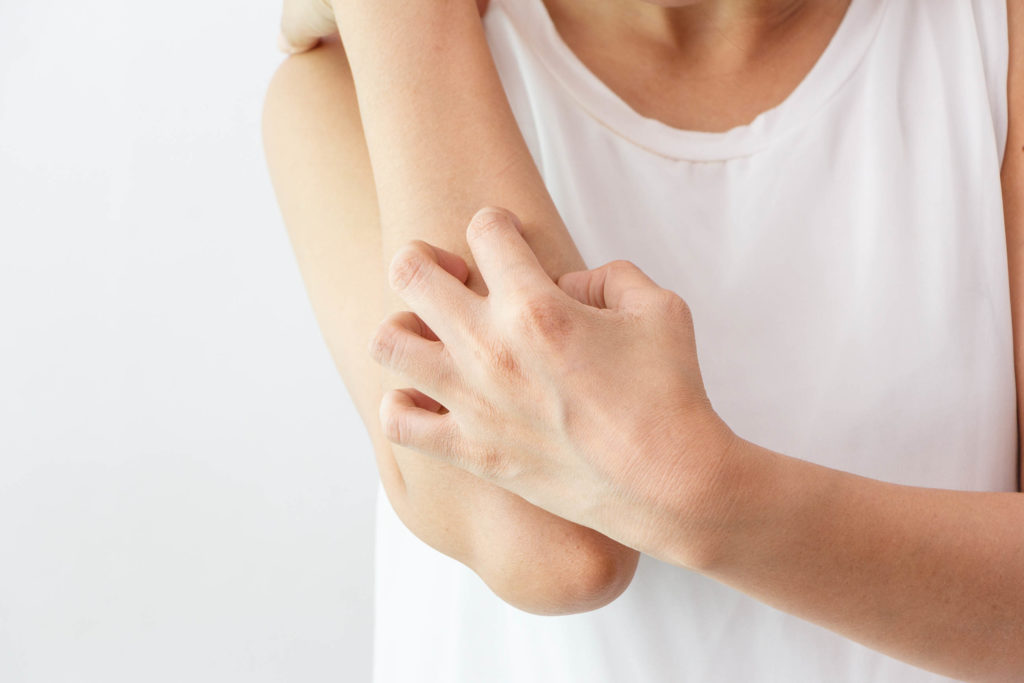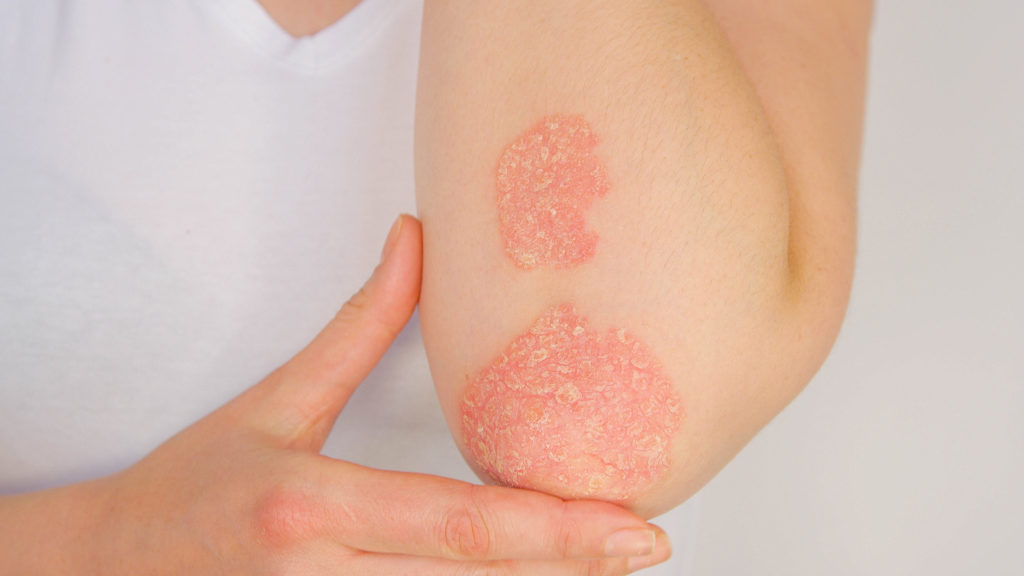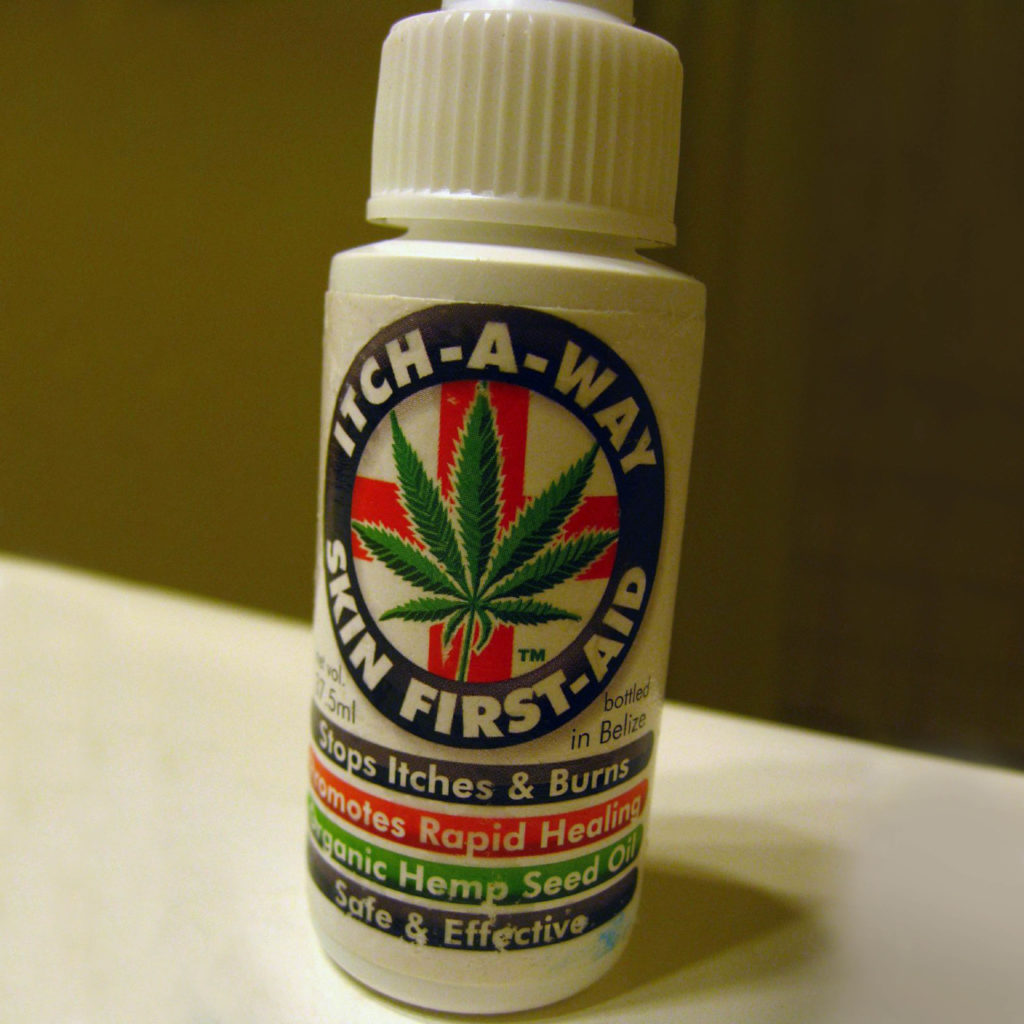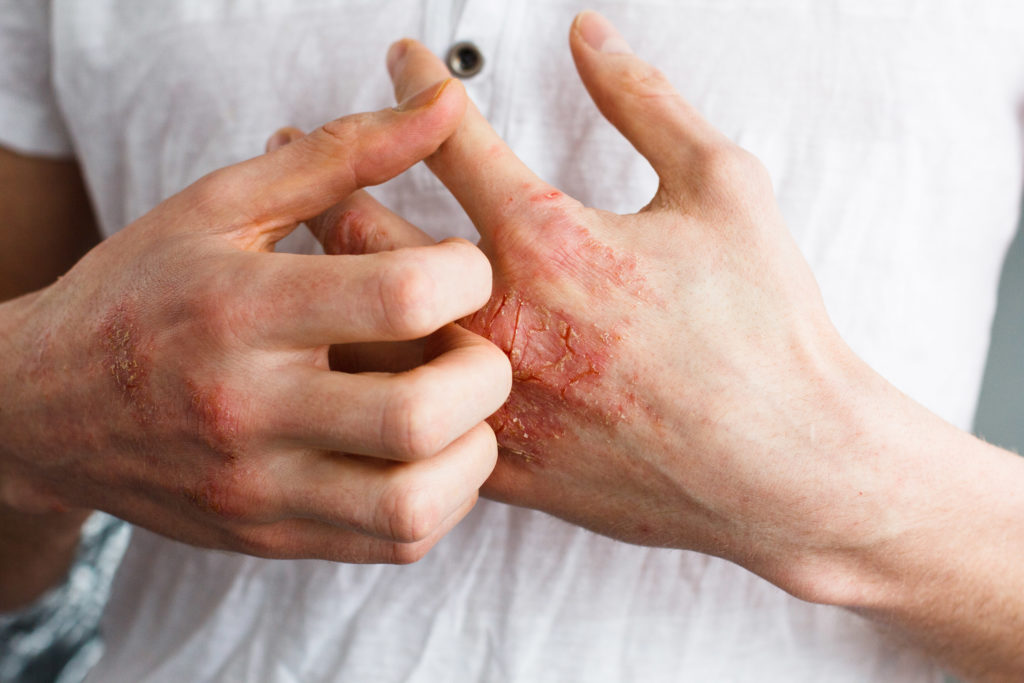Cannabis preparations have been repeatedly shown to alleviate the symptoms of chronic skin conditions such as eczema and psoriasis. The endocannabinoid system appears to play an important role in the regulation of various key processes involved in inflammation. Imbalance of the endocannabinoid system may even be a major underlying cause of skin complaints.
Chronic skin complaints such as psoriasis or eczema (formally known as atopic dermatitis) may occur due to genetic, environmental, or lifestyle influences, or a combination of the three. The exact causes of many epidermal problems are still unknown or unproven. The good news is that cannabis can be used in various ways to ameliorate the symptoms of most chronic skin conditions.
What causes chronic skin conditions?
Lifestyle influences that affect occurrence and severity of common skin conditions include obesity, stress, general ill-health, poor diet, smoking, and alcohol consumption. Environmental causes include changes in season or climate, particularly those involving dramatic changes in humidity.
Psoriasis may also afflict individuals taking certain prescription medications (including beta blockers, NSAIDS and lithium), or those with severely weakened immune systems—such as HIV sufferers. Prevalence of psoriasis varies widely between countries, and is estimated at around 2-4% in Western countries.
There are some skin conditions, such as granuloma annulare, which also have no scientifically proven causes but are suspected to be a reaction to something else which has happened to the body. Granuloma are an inflammatory response which occur in the tissues of the body – in this case, the skin – when it is trying to fight infection or protect itself from a foreign substance. Examples of incidents that may trigger granuloma annulare include developing another disease, injury to the skin, stings and bites from venomous creatures, and even being tattooed.

For eczema, it is postulated that overly sterile human environments may contribute to development of allergies in children. It is also suggested that dust mite allergy is strongly associated with the condition. Eczema is estimated to affect around 10% of all humans, to varying degrees of severity. In some areas, lifetime prevalence is thought to be as high as one-third of the population, and appears to be rising over time.
Symptoms of dermatitis
There are several forms of dermatitis. The two most common forms are atopic or chronic dermatitis (eczema) and contact or acute dermatitis (which is caused by direct contact with an allergen or irritant, and is often mistaken for eczema). The symptoms generally range from red skin and bumpy rashes to severe blistering and lesions in extreme cases. Blisters and lesions may weep or ooze and may ultimately lead to unsightly scarring.
Dry, itchy skin is the most common symptom. The areas most commonly affected include the cubital and popliteal fossa (the inner fold of the elbow and knee, respectively), the wrists, hands, and face. Eczema can be extremely debilitating, but is not fatal. However, resultant infections gaining a foothold through broken skin have occasionally been known to cause fatalities.
Infection by staphylococcal or streptococcal bacteria is very common in eczema. More rarely, this can lead to widespread infection and septicaemia. As well as this, the herpes simplex virus can infect eczema-damaged skin and cause an extreme condition known as eczema herpeticum, which can in turn lead to systemic bacterial ‘superinfection’ and even death.
Symptoms of psoriasis
Psoriasis also comes in various forms. The most common form is known as psoriasis vulgaris or plaque psoriasis. The ‘plaques’ this terminology refers to are raised, inflamed (often roughly circular) patches of skin covered with a silvery, scaly, plaque-like substance. These plaques usually appear on the elbows, knees, scalp, and back.
Psoriasis vulgaris affects up to 90% of psoriasis sufferers. Other forms include pustular psoriasis, which causes raised, pus-filled bumps or pustules accompanied by severe itching and tenderness. Pustules usually appear on the hands and feet, or randomly across the body.

A rare, potentially-fatal form of the condition is known as erythrodermic psoriasis. This debilitating disease can lead to inflammation and exfoliation of the majority of the sufferer’s skin. The severity of the inflammation and skin loss can be such that normal temperature regulation and barrier function control is irreparably disrupted and death can result.
Genetic influences on eczema and psoriasis
Eczema sufferers have been found to exhibit variations in the FLG gene that encodes expression of a protein known as filaggrin, which is crucial to regulation of the stratum corneum, the outermost layer of the epidermis. Filaggrin binds to free strands of keratin and causes it to form a matrix within the keratinocyte cells of the epidermis.
This tough, impermeable matrix is the foundation of the waterproof ‘barrier’ that makes up the outer layer of human skin. It keeps the skin hydrated both by preventing evaporation and by absorbing water. Variations in the FLG gene have also been implicated in another debilitating skin condition, ichthyosis vulgaris, which causes the skin to take on a scaly appearance due to over-production of keratinocytes.
Psoriasis, which also involves over-production of keratinocytes, has a strong genetic association; around one-third of sufferers report family history of the condition. It is thought that several genes interact to determine occurrence of psoriasis in ways that are not fully understood.
Around thirty-six different loci that correspond to psoriasis susceptibility have been found on the chromosomes. The genes found within these loci are involved in inflammatory response, and several have been implicated in other autoimmune diseases as well as psoriasis.
Chronic skin conditions and immune response
Both eczema and psoriasis involve an atypical immune response. Psoriasis is considered to be autoimmune in nature, as it does not occur due to any external allergen but due to a malfunction of the immune system that causes it to attack formerly healthy tissue.
Eczema is a generalised response to the presence of external allergens. It is not an autoimmune disease, although it is often present in individuals suffering from other autoimmune diseases, and certain other forms of dermatitis have an autoimmune component. Specifically, eczema and psoriasis are conditions that are caused by atypical inflammatory response.
The inflammatory response is a fundamental part of the immune system. Upon initial exposure to a pathogen (or perceived pathogen in the case of an autoimmune disease such as psoriasis), increased levels of blood plasma and white blood cells (particularly granulocytes) are brought, via the bloodstream, to the affected tissues.
These fluids then accumulate, causing the characteristic swelling. The increase in blood flow in the affected area causes reddening and the sensation of heat, and itching and pain occur due to release of compounds that stimulate the nerve endings.
Granuloma annulare and cannabinoids
Granuloma annulare, as mentioned above, has no established cause and unfortunately, no established cure. Traditional treatments range from steroid injections to hoping that it goes away on its own. Understandably, many people who suffer from it are dissatisfied with these options.
Although there have not yet been any specific studies on treating granuloma annulare with cannabis, there is some evidence that cannabinoids may help alleviate this condition. Angiogenesis (the formation and differentiation of blood vessels) is linked to inflammatory conditions and plays a large part in the formation of granuloma.
Experiments on rats in 2008 concluded that cannabinoids modulated the function of mast cells, which are mostly responsible for angiogenesis, thereby reducing granuloma formation. In this response to a patient’s question, Dr Philip Blair advises topical application of a CBD tincture or oil to treat granuloma annulare (although, as always, Sensi Seeds recommends you consult your medical practitioner before commencing any treatment).
Hempseed oil and skin complaints
Application of several different oils and emollients, such as petroleum jelly, beeswax, almond oil, olive oil, and various synthetic preparations, have been shown to reduce symptoms of psoriasis and dermatitis. As these conditions are characterised by overly dry skin, products which can moisturise the skin while avoiding further irritation are fundamental to their treatment.
In eczema and psoriasis, dry skin occurs due to excessive transepidermal water loss, as persistent inflammation compromises the skin’s ability to act as a barrier and regulate diffusion and evaporation.
Beyond directly providing moisture, compounds contained within some of these products may be the key to controlling the imbalance that underlies the condition. With hempseed oil and several other natural oils, high concentration of polyunsaturated fatty acids (PUFAs) is believed to reduce itching and inflammation better than moisturisers that are low in PUFAs. Linoleic acid in particular is thought to be of interest, although other PUFAs are also being investigated.

Dietary PUFAs and skin moisture
PUFAs are typically incorporated in the diet. There is evidence to suggest that dietary hempseed oil can raise PUFA levels in the epidermis and render them more comparable to the fatty acid profile found in ‘normal’ skin.
In a Finnish study published in 2005, researchers compared hempseed oil with olive oil, and found that the hempseed oil exhibited far more significant signs of efficacy against eczema. Dietary hempseed oil increased endogenous levels of two essential fatty acids (EFAs), linoleic acid (omega-6) and a-linolenic acid (omega-3). It also boosted levels of the non-essential PUFA, gamma-linolenic acid (omega-6). As well as this, transepidermal water loss decreased, subjective levels of skin dryness and itchiness improved, and perceived need for medication among patients diminished.
Although apparently no hemp-specific studies have been performed on psoriasis, plenty of anecdotal evidence exists, and there have been several studies which attest to the potential for PUFAs to be of use in this condition too.
A link between low rates of psoriasis and high consumption of PUFAs from fish oil in certain populations (such as Eskimos) has been established for some time, although in this case it is thought that two non-essential PUFAs, eicosapentaenoic acid and dihomo-gamma-linolenic acid, are of particular potential in reducing symptoms. Hempseed oil is mostly comprised of linoleic acid and a-linolenic acid. Conversely, the non-essential PUFA arachidonic acid is thought to be involved in the development of psoriasis.
Ratio of hempseed oil composition
As our understanding of the mechanisms underlying chronic inflammation grows, we are finding that diseases that affect the skin (one of the primary anatomical barriers involved in the immune response), such as eczema and psoriasis, are closely linked to another major barrier, the gastrointestinal tract. Thus, it may be that underlying problems with dietary PUFA absorption or utilisation in the GI tract also play a part in the development of chronic skin conditions.
It has been observed that fatty acid profiles of hempseed oil vary according to cultivar, with linoleic acid making up 50-70% and linolenic acid (both alpha- and gamma-) making up 15-25% of total volume. Gamma-linolenic acid content may be as much as 2.46% or as little as 0.80%. As we gain more insight into the complexities of PUFA levels and dermal health, different cultivars may be of use in different conditions, or specific cultivars may even be bred for specific purposes.
Cannabinoids and dermal health
It has been relatively well established that eczema and psoriasis respond well to PUFA-rich treatments. PUFAs are extremely widespread and can be obtained from multiple sources (although hempseed oil is an abundant source, with a generally favourable ratio).
Cannabinoids, on the other hand, are almost exclusively found in cannabis. They too have been demonstrated to have significant effect on chronic skin conditions. Cannabinoids are well-known to have a role to play in regulating inflammation, and it appears that this may be the key to their ability to treat eczema and psoriasis.

It is well-documented that the gastrointestinal tract (which, like the skin, is one of the primary physical barriers of the immune system) has abundant cannabinoid receptor sites. Research from 2009 indicates that the skin also has an endocannabinoid system of its own, which helps to regulate the production of various hormones and proteins (including cytokine, which is also involved in immune response), as well as various cellular process including proliferation, differentiation, and apoptosis (cell death).
Thus, imbalance of this system may also be responsible for the occurrence of chronic skin conditions such as psoriasis and eczema. Developing targeted cannabinoid therapies may help to control them.
A study published in 2007 showed that THC, CBD, CBN, CBG and anandamide all demonstrated some level of effectiveness in inhibiting keratinocyte production in the epidermis. As over-production of keratinocytes is involved in psoriasis, these results support further investigation into cannabinoid therapies to treat it. Cannabinoid receptors have been found in even the smallest nerve fibres controlling hair follicles; keratinocytes have also been shown to bind and metabolise anandamide, the most prolific endocannabinoid.
- Disclaimer:This article is not a substitute for professional medical advice, diagnosis, or treatment. Always consult with your doctor or other licensed medical professional. Do not delay seeking medical advice or disregard medical advice due to something you have read on this website.













Hello All:
I have had Psoriasis for 35 years too one degree or another. The skin on my arms and legs in atrophied. Its like I am made of glass in those area’s. Steroids, only for short term! Take that from an expert. 🙂
Your coming into a new age of treatments now. Non-steroidal creams, there are several in the pipe-line at stages 2 and 3 so check with your doctor. They look extremely promising but, you do not want to use them long term either.
Both types of treatments above just a stop gap while you fix the cause and effect of most if not all immune disorders. DIET. My nails cleared up in about 3 months after going Gluten free. Flares stopped for the most part during this period.
Going Gluten free is in my opinion the most effective FIRST step. Other very helpful foods to not eat are – All Nightshades (Eggplant, White Potato’s and Tobacco are the top three). Beer, stress, brown spirits (whiskey/brandy) and chaffing clothing all contribute in their own special ways.
Dairy (Processed big Dairy brands, not dairy any more, been changed by heat and other nutrient destroying processes. Actually not even milk any more. These types of foods are all seen as toxins by your body and will stimulate your immune and make you flare, especially GLUTEN)
Cannabis, edible mushrooms (turkey tail and others) will be the future medicines that heal, not treat.
How bad to want to be free of your scourge? Start right now.
I had a tick bite in 2015 causing Lyme Disease. After many alternative treatments, the Lyme was gone by March 2017 however I was left with deep pain in my neck, upper back, shoulders and upper arms. Given medical permission to use cannabis with minnimal THC and high CBD, I injested a hybrid cannabis oil which made me feel normal. NO PAIN. However after a month of taking 0.5 ml oil 3 or 4 times daily, a random rash began to appear all over my body. A dermatologist prescribed a cream for spots and a soap and lotion to use. I stopped the cannabis use immediately believing it may have been an allergic reaction to the cannabis strain I was using. Testing did show that my body did not like the cannabis. However after a month and a half without using the cannabis, the discontinuation of the cannabis is showing a return of the arthritis pain and a continuation of the random appearance of blister-like spots. Still just treating symptoms. A biopsy determined that I have Lymphoeosinophilic Infiltrate which means I had a bug bite (a tick 2 1/2 years ago?) OR an allergic reaction to a medication (cannabis oil). So how long before the previous strain of cannabis oil will leave my body? I want to test next time before I choose a more compatible strain of cannabis oil but I want the previous strain out of my body because now I have both spots with itch and returning and increasing pain for lack of the more compatible cannabis oil.
All my life I have no skin conditions besides the normal acne breakouts before my periods to suddenly breaking out in rashes. Started from my back to my thighs and eventually all over my body in December 2015. I saw 4 dermatologist and was told it’s ezecma than it can possibly be my nerves to a bad kidney ?. All the steroid creams they gave me did nothing so they decided to put me on Gabapentin, which helped me with the itch and all the rash on my body disappeared BUT my scalp has been super irritated. Its very itchy, feels tight and so uncomfortable, to the point that I get goosebumps all over my body due to the irritations. They did a biopsy on my scalp and it came back negative for everything they tested for…. basically it shows very little abnormality. Now they are saying I just have severely dry scalp and they don’t know how to treat it. They told me to talk to my hairdresser about it and try hot oil treatment and deep conditioning. I’ve done all that and it’s just getting worse. They recommended acupuncture, which I also tried but it was a fail as well. I’m smoking marijuana every night to get some sleep and I noticed that after I smoke… my scalp gets a rash. When I scratch it, I can hear the tiny little rash pops and crackle but no fluids. It seems like the marijuana cause my hair follicles to bubble up or something. If I don’t scratch and leave the bumps/rash alone, the next morning it becomes a layer of dry skin. When I scratch, I see tiny little specks everywhere. Doctors gave up and I give up. I don’t know how to battle this anymore and sometimes I think about taking my own life to relieve myself of this misery.
Anyone have any suggestions please help. Thanks and may god bless you all.
Dear BYS,
Thank you for your comment. I am sorry to hear about your situation, that sounds truly frustrating 🙁 I can’t give you any medical advice (see below) but I can suggest that you eat plenty of hempseed and hempseed oil to make sure you are getting lots of essential fatty acids, and you could also try putting hempseed oil directly on your scalp (if the skin is not actually broken open) to see if that helps.
Unfortunately, as Sensi Seeds is not a medical practice, we are not able to provide any advice relating to medical situations other than to consult your doctor or other licensed medical professional. This article, written specifically for healthcare providers who may not be aware of the many properties of cannabis, may be useful to you in talking with your doctor. You could also try to contact local medicinal cannabis support groups, if you have not already done so. In the UK, there is the United Patients Alliance (you can find them on Facebook) and in the US and EU there are many branches of NORML (google NORML followed by your area name). We hope this is helpful.
With best wishes,
Scarlet
Hi, one of our relative children has Ichthyosis skin disease. We know that It’s genetic but this twelve years old boy has a very fast progression of this disease. All I am asking is that is hemp oil helpful for this disease? I couldn’t find any relative link for this disease and cannabis oil. can you please give some advice that is cannabis oil helpful for this disease or not.
thank you so much
Dear Atefeh,
Thank you for your comment. We are sorry to hear about your situation. Unfortunately, as Sensi Seeds is not a medical practice, we are not able to provide any advice relating to medical situations other than to consult your doctor or other licensed medical professional. This article, written specifically for healthcare providers who may not be aware of the many properties of cannabis, may be useful to you in talking with your doctor. You could also try to contact local medicinal cannabis support groups, if you have not already done so. In the UK, there is the United Patients Alliance (you can find them on Facebook) and in the US and EU there are many branches of NORML (google NORML followed by your area name). We hope this is helpful.
With best wishes,
Scarlet
I have granuloma annulare. in recent months it’s really spread all over my body!
I mentioned to a retired nurse that histamine (in some wines and cashews) might be a trigger…so she suggested taking an antihistamine. I’ve been taking it and it seems to be calming things down. that along with an emu oil that has other infused ingredients seems to be working. I also have not been using soap…only washcloth. I use raw inner filet of aloe as lotion. hope this is helpful. this things seem to be working for me…I remain hopeful!!
I have had psoriasis primarily on palms and soles for 6 years. It was debilitating, until I stopped eating gluten and dairy. There are a couple other foods I react to, but in general the change was huge, having to wear gloves to use my hands to minor spots, sometimes in the last year, periods of none at all. It is an autoimmune disease so experiment with food group elimination. Hard at first, but then when you find it working, really easy to stay away from foods that cause that much pain!!
Just trying some cbd oil on a cracked spot, it takes the pain away, and and looking forward to seeing if it speeds healing. Also plan on getting some hemp oil and seeds to add to my diet.
Thanks so much for this wonderful trove of information!!!!
I have atopic dermatitis and I am basically desperate. I was born with this disease, I know it’s genetic. I have tried literally ALL the products that doctors prescribe for me (creams, oils, antihistamines, corticosteroids …), but they never prescribed anything to me based on cannabis or something like that. I started taking costisone 2 years ago, after a very exuberant crisis, and since then the crises are getting worse and more recurrent, so I have been forced to increase the doses of cortisone to obtain the same results. I am exhausted and tired of having to resort to cortisone (because of the side effects). Do you suggest me to try anything specific?
Dear Mariana,
Thank you for your comment. We are sorry to hear about your situation. Unfortunately, as Sensi Seeds is not a medical practice, we are not able to provide any advice relating to medical situations other than to consult your doctor or other licensed medical professional. This article, written specifically for healthcare providers who may not be aware of the many properties of cannabis, may be useful to you in talking with your doctor. You could also try to contact local medicinal cannabis support groups, if you have not already done so. In the UK, there is the United Patients Alliance (you can find them on Facebook) and in the US and EU there are many branches of NORML (google NORML followed by your area name). We hope this is helpful.
With best wishes,
Scarlet
Just a “quick” question. I have contact eczema and I’ve tried lots of products to stop the itching, to no avail. Sometime I scratch myself until I draw blood. How can cannabis based treatment help? Thanks!
I have atopic eczema and I too scratch myself ultil I draw blood. Would really like to have your question answered too
I’ve had eczema since childhood off and on and have mostly used strong ointments with steroids in them to clear and heal the skin. Tried many over the counter products as well over the years, but nothing helped to get rid of the eczema, itch or heal the skin. After just using dermalmd psoriasis serum for a few days noticed an incredible difference. The itching disappeared almost instantly and the skin began to clear up and heal beautifully. Would definitely recommend dermalmd psoriasis serum as it has certainly helped me.
I have very severe psoriasis on feet, not able to walk MANY days because the skin breaks and comes off leaving raw flesh and then it comes back again. Where can I get the dermalmd psoriasis serum? I have used many steroids and Mexthexrate, (spelling ) which damaged my liver. Now the derm wants to put me on Otelza but I am afraid of it. Am trying to get some cannabis (not legal here
I have had a level 20 on a scale of 1-10 breakout of both psoriasis (on my legs..shins mostly) and atopic dermatitis (neck, stomach, arms) for a consistent 6 months now. I was diagnosed with the psoriasis 8 yrs ago and maintained it with tanning. I broke out with and was diagnosed with atopic dermatitis in Feb 16. This was at the same time i started working out 4-5 times a week. NOTHING rids it, coconut oil after a shower while still wet contains it (I think) to a level 18. I keep neosporin cream (not ointment) on my legs and a non stick gauze wrapped with a sport bandage on my legs. That does help. Some. I just learned the 2 occurring at once is a “rare phenomenon”.. But a study showed 5 patients with both had a similarity..nickel allergy. Work out equipment contains nickel. What if any thing will this do for me?
Miserably,
Lacey
I have had psoriasis all over my body for over 10 years. Exceptionally bad under my nails and on my scalp. I am 46 and live in constant discomfort, never mind the embarrassment. I have spent thousands on injections under my nails (sooo painful) and on creams. I keep my hair short so I can try the next useless cream or lotion on my scalp.
I also bought a special light that i use for my body – but it cannot penetrate my nails and scalp.
All i want to do is not hide my hands and grow my hair.
I really would like to try this product but not sure on the next step forward. Where can I get this product. I will travel for this, if i know there is a chance of some relief.
Please mail me your advice – i would so appreciate it.
Hi Deirdre, thanks for your comment. We are sorry to hear about your condition!
I am not sure which product you are referring to, as several are mentioned in the article. Hemp seed oil, which can be eaten and also used directly on the skin, should be available from good heath food shops. If you live in an area where medicinal cannabis is legal, you may be able to obtain topical creams from a dispensary.
As Sensi Seeds is not a licensed medical practitioner, we cannot give advice about medical conditions and all we can do in specific cases such as yours is to recommend that you consult your doctor or registered healthcare professional about using cannabis. If you do, you may find this article helpful as it was written specifically as a guide for doctors and professionals who may not be aware of all the ways in which cannabis can be used. I hope this is helpful, and good luck!
With best wishes,
Scarlet
I was bit by a dog back in November.2015, to this day my skin is covered and trying to heal from a rash that started at the wound site. I have been in so many steroids, creams I am miserable I only sleep a few hours a night!. I have been to Pittsburgh several times and I was told t is an ID reaction. The bite gave me a staph infection that took a long time to heal!. Now, I have itchy skin!. The lesions are slowing healing , however it does not help when I wake up scratching!. I have also used cox it oil, vasoline . I can no longer use a lot of scented products everything breaks me out will hemp oils and products help me ?? I am desperate to heal and for my health and skin! Thank you.
You most likely have tsw topical steroid withdrawerl look it up. Also known as red rash syndrome
I have Palmoplanter Pustulosis. A type of Psoriasis. It’s on my hands and feet. What’s the best hemp treatment? Pills, creams, or both? I do not want to take the cancer drug called Methotrexate. Help!
Did you ever find something for this ? I’ve had this for over 3 years and nothing ever clears it.
Recently I developed a skin ulser on my lower left leg. I ground up some cannibus bud and sprinrkled it all over my leg. It began to work right away. It killed the infection! No more itching and the sore was almost gone the next day. I think the sore was a strep or staph infection. I was so excited I felt I had made a medical breakthrough, so I had to note it for any one else suffering from this infection. Please try it, what have you got to lose, but your leg! Thank you.
I had an ulcer on my leg for 35 years nothing could help, Then one day I went to Kew Gardens in the UK where they claim to hold samples of every plant known to mankind. While there I walked in the same area as a Cannabis plant had been grown 10 years previously, As soon as I opened the gate to the fenced off area. I felt the benefit. And after six minuets walking in the fenced off garden I was healed. Within the first 3 mins The ulcer scabbed over, I felt a warmth and tingling coming from under the scab, and then it fell off! Leaving clean skin underneath. I can now also play the harpsichord and ballet dance to a lesser degree.
I have granolium allunare will hemp oil help my skin condition ?
Can anyone explain how with my hands?
Where and what products are the best? I live in Canada wondering where the best spot to get it from please email me some info thanks
As a last resort I am turning to medical marijuana in hopes it may help at least minimize a skin condition I have been suffering from since I was 62. I am now 72. I have had 2 biopsies confirming I have “Granuloma Annulare”. After seeing 4 dermatologists I gave up on conventional so-called “best new drugs on the market” which were extremely expensive but did nothing. As a result, because the condition is so unsightly I am forced to wear long sleeves and long pants in one of the hottest climates in the U.S., Florida. Even medical personnel who see me for the first time jump back and say, “what’s that?” The medical and research community all agree they have only 4 to 6 guesses on what causes it. I joined a chat room with other sufferers. A few have been successful with drinking 1/4 cup of organic apple cider vinegar. It did not work for me. There are 4 different forms of the GA, and I seem to have what’s referred to as the “general” form. I can either forward photos of my own condition which grows worse with each passing day, or you can search it on the internet to see what it looks like. But I’m hoping you might be able to provide me with a remedy that might at least stop the spreading.
Some of the research which has already been done (none since 2003), shows it could be caused by one of the following: Loss of T-cells with the aging process (this is despite the fact that it does occur in young people), it could be loss of hormones (I spent 2 years trying hormone replacement therapy), it could be stress-related (I have taken Xanax with no change, I have converted my diet to all organic, it could be allergy related (I am allergic to nickle which is and always has been in absolutely everything), and a few others that I can’t recall. I hope this will give you a clear picture so you might be able to recommend a particular brand of which type plant might work for me. I await your reply.
Dear Marscha,
Thank you for sharing your story. Due to restrictions we unfortunately are not allowed to give such information. Please visit http://forum.sensiseeds.com. Users there might be able to help with your questions.
Lots of luck!
Marsha,
I wish this comment was not a year old!! And i hope that by some means you see my reply! I am 30 and was just diagnosed with this as well TODAY!! I have had an area on my foot for 8+ years that I was told was ring worm, a fungal infection, staff infection and then just told that they do not know. I finally gave up and then it started to get worse this past year. I went to a new dermatologist who finally told me it was this granuloma annulare and that pretty much they do not know why it does what it does, and that I will have it for the rest of my life. Strong steroids in a cream is the first step, if that doesn’t work, lots of steroids in injections in very small areas (and I have a large area of this gross looking thing), and then I don’t know what comes after that if this fails.
I am already a medical marijuana patient in my state due to my seizures and nerve damage in my leg, so I thought to myself why not try one of the topical creams that the dispensary sells. SO I am going to try that. I wish my state allowed me to grow, because I feel that if I could make like a poultice from the leaves and put it on over night that would help as well. I also think I will try and buy some hemp seed oil and see if that helps as well.
Im looking for a friend she has Hydrodinitus (very rare condition) lots of inflammation from her arthritis,she has open wounds to dress a few times a day,had skin grafts til they can take no more away,26 years she has had this condition & it’s hard to watch the pain she is in & her being ready to give up she is only 43.. Any advice greatly appreciated
thank you in advance
Hey Janine have you found any info about your friends rare medical condition?! Is there any hemp or canabis products available for this condition?!
Hey Janine have you found any info about your friends rare medical condition?! Is there any hemp or canabis products available for this condition?! Have anyone heard of canabis helping a rare condition called hidradenitis suppurativa?
Keep up the good word! Thanks!
I have suffered from psoriasis since my dad died in 1985. I have had a heart attack in 2000 where my psoriasis went, but getting back into my stressful life, it reoccurred,and I still have it. I have tried so many products, the most recent is Diavobet. Since I have been using it, I have bad bruising on my body. I only have to scratch and I have purple bruising. I am at the end of my tether,and I just want something that can help me.
Try eating 3 taps of hemp seeds per day. I bought mine from Nutiva.
Hello Everyone,
I get severe plaque psoriasis on my palms and soles (amongst other areas but it’s the worst on my hands and feet). I found that regular cannabis use helps prevent outbreaks from getting worse and even helps shrink the plaques. Also it helps with the pain and most importantly the insanity-level itching. During my last outbreak I was prescribed Oxycontin which didn’t help because it did nothing for the itching, so I flushed them…. Before the cannabis I was lucky to get 3 hrs of sleep a night (fragmented into 10-30 minutes at time). Once I used cannabis I could get 6+ hrs of sleep a night (in 2-3hr sections) a huge improvement. This also led a reduction in the depression that comes along with sleep deprivation and the demoralizing feeling of being 24 and needing a cane to walk. I also find that topical creams that contain hemp seed oil work better than perspiration topical creams. If you live in a medical state try it. I don’t have that luxury, but my thought is that as a tax-paying, otherwise law-abiding citizen the government can get bent since they want to deny me the only medicine that works and doesn’t ruin my liver.
Also I recently had to stop using cannabis because I’m looking for a new job, and I currently have a few small plaques on my hand that have been getting worse :/ ….. I just hope I don’t have to go too much longer without my medicine.
I have psoriasis on parts of my bod& also on my scalp. Would hemp oil relieve my psoriasis of itching & pain? Should I ask my Dermatoligist if she recommends marijuana for my psoriasis? These prescription creams seem like they aren’t working too good. Thank you for any of your advice. Candia
I tried hemp oil before but it didn’t seem to work, but I was not consistent in using it.
Seven days ago I started using it internally, takin a tsp four times a day. After about four days I noticed a real difference, especially if I was consistent and took a good tsp upon waking, around noon, supper time and before bed. By the end of the first week, even the hard knotty bits that would persist and not clear up were healing.
I can’t believe it. I got the monster ten years ago, age 55 and have been on the chemicals all that time yet still had terrible skin, dry, flaky with tones of hard bumps and hard knotty scabs.
I think I am about 80% improved and itch free as long as I am consistent in imbibing this oil. Today I am starting to rub it into my skin, every centimetre. I then walk around in my light house coat until it seems to have soaked in and no longer seems to smell like hemp oil. (I don’t mind the smell.) I will apply this upon waking and before bed.
I have saved this site and will be back in a month or so to let you know if this bad puppy has finally been put down and is out of my misery. Interestingly, yesterday I forgot to use my chemical cream (I had to apply it twice or thrice a day—I actually dilute it in a small container with 80% hot water, shake it like crazy and then lightly apply it.) I am going chemical free and only use my new protocol. Really, eczema (and I think from the pictures I also have psoriasis) has been the bane of my life these past ten years.
I sure hope it works on little children and that mums will see this and try it. I can’t imagine how horrible this would be on the little ones.
(I may have entered the wrong gmail so I have reposted this.)
Namaste and care,
mhikl
How are you going now, have heard since July 2016.
Did you use CBD oil or regular hemp oil that you get a a herbal store?
Did you take hemp oil or hempseed oil? Can you tell me brand and wheee you got it? I have eczema really bad.
I have DSAP (Disseminated Superficial Actinic porokeratosis).
I was wondering if Cannibis oil might help make the skin look better.
I have no pain or itching, it just looks terrible. 🙁
Thank you.
KC
I am unable to find any relevant information, unfortunately. However, given cannabis’ ability to reduce inflammation, as well as its ability to induce cell death in diseased cells, it may well prove to be useful.
THC only causes cell death in several Tumor types not just any diseased cell unfortunatly
I have dsap also, just seeing if you tried the oil and if it helped?
I too have dsap. I’ve tried chemo cream. Nothing works. Would love to have an answer to this. The Internet is full of cannibus oil curing cancer stories.
I am trying it as we speak on DSAP. I have been applying the oil (Empower Black) twice a day for 2 weeks. I have noticed small shrinkage and less roughness more redness (maybe it is working?). I will let you know how it goes after a month or so.
I have been using CBD topical oil and Gummies for back pain and have seen a marked improvement in my DSAP. I’m not sure which helped but I’d suggest you try both! I’m elated with the improvement!
tengo psoriasis, quisira tener mas informacion, sobre medicamentos
We are in good hands
Great ! Article
Hi, i suffer from psoriasis of the scalp and I’m desperate to find something to help ease all the symptoms, is this treatment available?
Its all about the food we ingest. I had psoriasis for over 10yrs. Scalp body and in my finger nails. Finally went and saw a natural skin clinic. I eliminated all the foods they suggested, had zinc oil, anti inflammatory, a gel wash and cream from the clinic and it went from all of my body 99.9% from my scalp and its gone from my nails. It took 11 weeks. It cost less money than I have spent over 10yrs. I haven’t put a steroid on my body since the day I started. I stay well away from these foods to this day. I never thought I would as there were a few foods that I didn’t think I could part from however I did and my skin is in remission.
I would suggest and highly recommend this to anyone.
I now have Hashimoto’s disease which is an auto immune disorder which might or might not be linked to psoriasis however it is an inflammatory like psoriasis so my next step is unrefined hemp oil. It apparently is magic.
Would you mind sharing the name of the natural skin clinic that helped you? Or at least tell us what foods they recommended to stay away from? Any information would be greatly appreciated. Thank you.
Karen which foods did you eliminate? I know about the nightshades and shellfish like crab and shrimp (which I love) but was there anything else? I only had psoriasis on my elbows 3 yrs ago but in the last 3 months I’ve developed it on my hands and my fingers are swollen and cracking. So painful like having paper cuts all over.
What were the foods you gave up?
Can you let me know what foods you were told to stay away from as I have psoriasis and have been staying away from a gluten, dairy, nightshades, corn, red meat and legumes and I still have it. Also what supplements did you take? Thank you and glad you have found something that worked for you!!?
Hello, I was wondering if you could elaborate on what you mean by natural skin care clinic?
I’m wondering what the name of this clinic is?
Have you tried Low Dose Naltrexone?
Could you tell me the name of the skin clinic or even what city or any hint of a name. I am desperate as well.
Thank you,
I make my own cannabis salve. It works better than anything!
There is a new store you can find online called BC Hemp Store has shampoo conditioner soaps deodorant, etc sprays for pain
I have had Severe itching about six months now. I have had every blood test you could imagine. No one can give me any answer or solution, I’ve been prescribed antidepressants tropical creams nothing works even Lírica I feel like I’m being misdiagnosed has anyone had this problem, if so what did you do to treat it? Please email me. It’s driving me crazy.